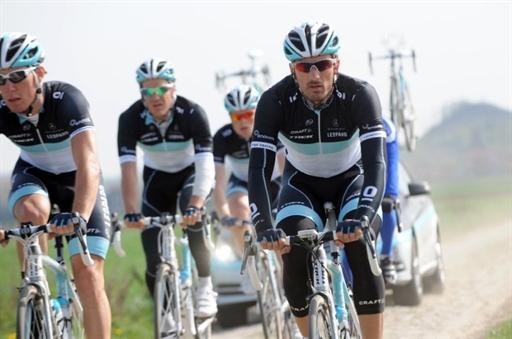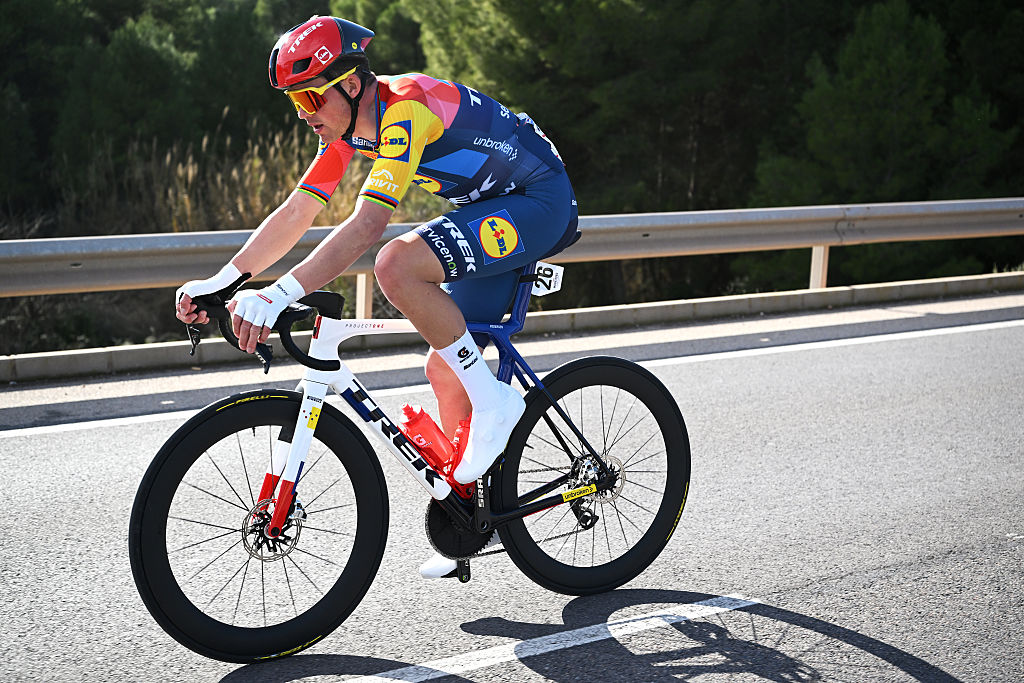Cancellara unconcerned by new cobbles at Paris-Roubaix
Swiss rider moves to downplay criticism of Nuyens and Boonen
The latest race content, interviews, features, reviews and expert buying guides, direct to your inbox!
You are now subscribed
Your newsletter sign-up was successful

Fabian Cancellara does not believe that the new section of pavé immediately after the Forest of Arenberg will make a significant impact on the outcome of Paris-Roubaix. Speaking at Leopard Trek's pre-race press conference in Kortrijk on Friday, the Swiss rider also moved to downplay criticism he had made of Nick Nuyens and Tom Boonen in the aftermath of last weekend’s Tour of Flanders.
Cancellara tested the new cobbled section at Millonfosse-Bousiginies on Thursday morning as he and his teammates reconnoitred the course, and he did not see enough to alter his thinking substantially ahead of the Hell of the North.
"There are cobblestones again sooner after the Arenberg, but they’re not so special and not so hard," Cancellara said. "When you look at last year, the sector we had afterwards for almost 4km was pretty long and harder. In the end, it’s all about how the race pans out. It depends on whether there’s a small group or not. But before that you can’t really say, we have to make the race before that."
In the wake of his ultimately failed attack on the Leberg at the Tour of Flanders, Cancellara had told reporters that he had sought not only to win the race, but to mark its history by riding the perfect race. He refused to be drawn on the precise nature of his tactics for Paris-Roubaix, but he acknowledged that a hard race would suit him better than a tense, tactical one.
"The best thing would be to have all the favourites at the front early," he said. "It's always hard to know what the best scenario is. Obviously you hope that the others have a weak moment and you have the best day. That's the dream, but dreaming is one thing…
"In the end it's Roubaix, I'm for sure not the only one who wants to win. We saw on Sunday there are strong riders who will be up there. Before Flanders, it was only my name that was being spoken about, but now people see that there are other riders. There’s a large strong team from BMC, and Quick Step have been riding well too."
To that end, the Tour of Flanders provided Cancellara with a useful barometer both of his form and that of his rivals, as the all of the main classics contenders were finally all present and all riding to win rather than looking to build form.
The latest race content, interviews, features, reviews and expert buying guides, direct to your inbox!
"Before Flanders nobody really knew which rider was on which level," he said. "There was Harelbeke and Gent-Wevelgem, but they were two different races. When you’ve seen a super hard race, then you can say something more about it. After Flanders you can see who can be up there when it is really hard and who can do what kind of thing when there’s a possibility, like Tom Boonen’s really long sprint at the end."
A bad Monday
While Cancellara was admirably gracious in the immediate aftermath of his third-place finish in the Tour of Flanders, he appeared to have changed his tune by the following afternoon. In an interview published in Corriere della Sera on Tuesday, he was critical of both the victor Nick Nuyens and his main rival Tom Boonen. At Friday’s press conference, Cancellara was keen to put the matter down to a linguistic misunderstanding.
"I had a bad Monday," Cancellara laughed. "First of all, I have nothing against Tom or Nick, it's just maybe the way of my explanation in languages that makes things sound differently.
"In the end of the day I haven't seen everything that was in the papers. I know that it’s an intense week where everything you say can maybe turn into make a nice story, but it was not the fact that I wanted to go against them."
Cancellara also revealed that he had advised Nuyens to join Saxo Bank last autumn, and his success under Bjarne Riis' tutelage has come as no surprise.
"I think even Bjarne Riis said that they have done a lot of work on his position, training, motivation," Cancellara said. "I also said to him on the Vuelta last year [when Nuyens was pondering a move to Saxo Bank – ed], 'hey, do what is necessary to do, and you won’t go wrong with Bjarne.' I think he has made the right choice, 100 per cent."
Cancellara also told L’Équipe during the week that he preferred to finish third in the Tour of Flanders rather than let Tom Boonen win the race, but he claimed that those comments were taken out of context, explaining that if he hadn’t driven the winning break in the finale, he may not have even finished on the podium.
"I respect Tom as a person and a rider," Cancellara said. "He wants to win, I want to win. [In the finale of Flanders], I'm in the front with Sylvain and then Tom comes from the back. In the end, I prefer to be on the podium because when you don’t know who is on his back wheel, you never get things for free."
However, Cancellara did acknowledge that the Tour of Flanders had been a hugely tactical race, as demonstrated by television pictures which showed an exchange between the Quick Step and Leopard Trek team cars when Cancellara was off the front with Sylvain Chavanel ahead of the Muur.
"Tactics were making the race," he said. "Even in the television you have seen Wilfred Peeters saying to Torsten Schmidt, 'ah, he’s too strong, he’s too strong, he can ride 60km alone.'"
In spite of his third place finish, however, Cancellara declared himself pleased with his performance in De Ronde. "I could come out of Flanders really, really happy because I did the maximum that was possible," he claimed. "Okay I had these cramps. People saw me as human and not as superman or someone who comes from the moon."
With a rather unfortunate choice of metaphor, Cancellara also expressed his pride at the manner in which he recovered physically and psychologically after being reeled in at the foot of the Muur.
"I had a few moments, from the Muur until the Bosberg, where I lost my confidence and focus, but then I saw Gilbert attack and I thought it was over," he said. "But I saw that he and the other riders were going fast but not fast to make big gaps straightaway, so it was like restart engine and with one click you came back fighting again."
Skipping Paris-Roubaix to focus on the Ardennes?
After his dazzling spring campaign of 2010, Cancellara made optimistic noises about turning his attentions to the Ardennes Classics, and Liège-Bastogne-Liège in particular. While he again targeted the cobbled classics this spring, the Swiss rider was coy about the possibility of forgoing Paris-Roubaix in future so as to focus on a first win at Liège-Bastogne-Liège.
"Maybe, it depends what the result is on Sunday," he smiled. "I'll race first and then see."
Cancellara explained that it was simply not possible to be competitive at both Liège-Bastogne- Liège and Paris-Roubaix in the same season, and cited the all-round talent Philippe Gilbert’s programme as proof of that.
"You definitely need a different preparation for Liège," he said. "Gilbert isn't riding Paris-Roubaix nor did he ride Scheldeprijs. After Roubaix you lose something. Even in the two days or so I will have to train before Amstel, which is my last race before I take a little break, I will need to train differently.
"For Liège, that would never work. I’ve never studied training, I’m not a doctor of training advice, but I know it would be impossible. In this generation that we’re riding in now, you need to be very specific. You can't do everything because doing everything is impossible."

Barry Ryan was Head of Features at Cyclingnews. He has covered professional cycling since 2010, reporting from the Tour de France, Giro d’Italia and events from Argentina to Japan. His writing has appeared in The Independent, Procycling and Cycling Plus. He is the author of The Ascent: Sean Kelly, Stephen Roche and the Rise of Irish Cycling’s Golden Generation, published by Gill Books.
